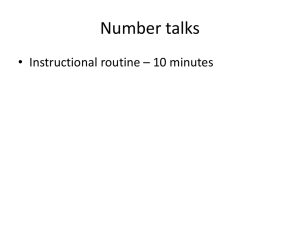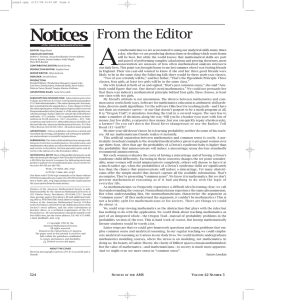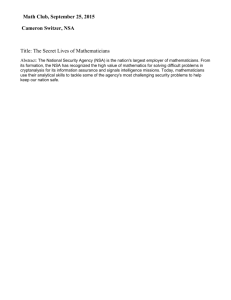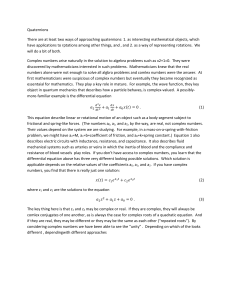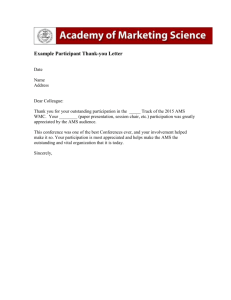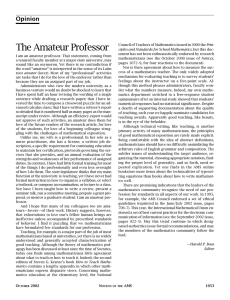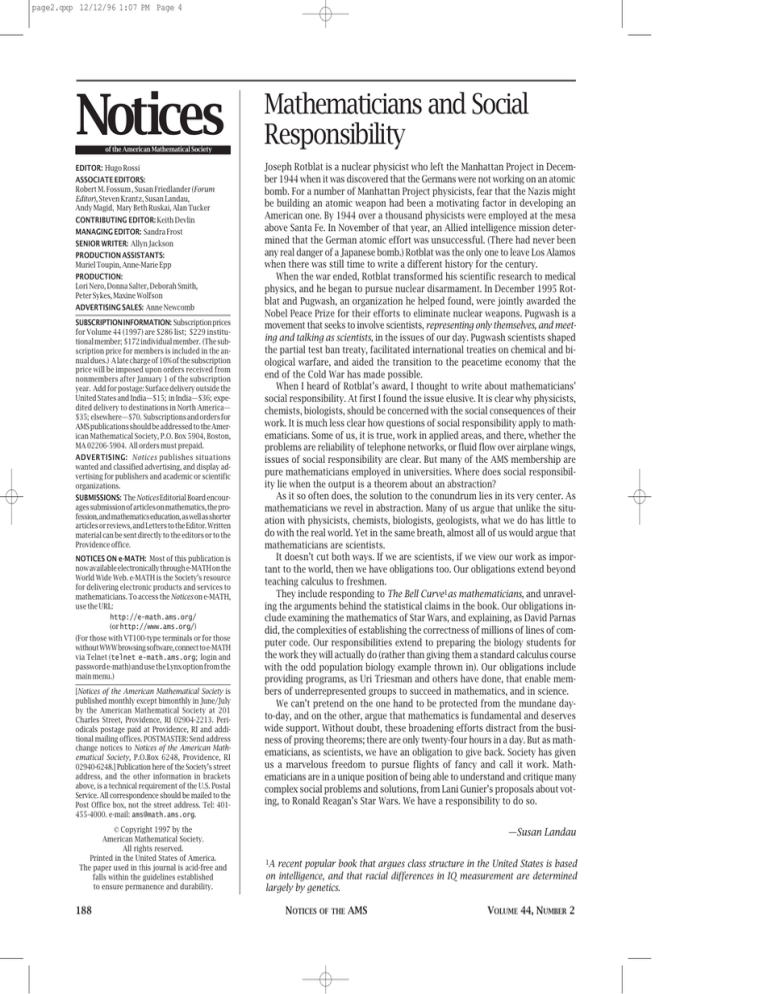
page2.qxp 12/12/96 1:07 PM Page 4
Notices
Mathematicians and Social
Responsibility
EDITOR: Hugo Rossi
ASSOCIATE EDITORS:
Robert M. Fossum , Susan Friedlander (Forum
Editor), Steven Krantz, Susan Landau,
Andy Magid, Mary Beth Ruskai, Alan Tucker
CONTRIBUTING EDITOR: Keith Devlin
MANAGING EDITOR: Sandra Frost
SENIOR WRITER: Allyn Jackson
PRODUCTION ASSISTANTS:
Muriel Toupin, Anne-Marie Epp
PRODUCTION:
Lori Nero, Donna Salter, Deborah Smith,
Peter Sykes, Maxine Wolfson
ADVERTISING SALES: Anne Newcomb
Joseph Rotblat is a nuclear physicist who left the Manhattan Project in December 1944 when it was discovered that the Germans were not working on an atomic
bomb. For a number of Manhattan Project physicists, fear that the Nazis might
be building an atomic weapon had been a motivating factor in developing an
American one. By 1944 over a thousand physicists were employed at the mesa
above Santa Fe. In November of that year, an Allied intelligence mission determined that the German atomic effort was unsuccessful. (There had never been
any real danger of a Japanese bomb.) Rotblat was the only one to leave Los Alamos
when there was still time to write a different history for the century.
When the war ended, Rotblat transformed his scientific research to medical
physics, and he began to pursue nuclear disarmament. In December 1995 Rotblat and Pugwash, an organization he helped found, were jointly awarded the
Nobel Peace Prize for their efforts to eliminate nuclear weapons. Pugwash is a
movement that seeks to involve scientists, representing only themselves, and meeting and talking as scientists, in the issues of our day. Pugwash scientists shaped
the partial test ban treaty, facilitated international treaties on chemical and biological warfare, and aided the transition to the peacetime economy that the
end of the Cold War has made possible.
When I heard of Rotblat’s award, I thought to write about mathematicians’
social responsibility. At first I found the issue elusive. It is clear why physicists,
chemists, biologists, should be concerned with the social consequences of their
work. It is much less clear how questions of social responsibility apply to mathematicians. Some of us, it is true, work in applied areas, and there, whether the
problems are reliability of telephone networks, or fluid flow over airplane wings,
issues of social responsibility are clear. But many of the AMS membership are
pure mathematicians employed in universities. Where does social responsibility lie when the output is a theorem about an abstraction?
As it so often does, the solution to the conundrum lies in its very center. As
mathematicians we revel in abstraction. Many of us argue that unlike the situation with physicists, chemists, biologists, geologists, what we do has little to
do with the real world. Yet in the same breath, almost all of us would argue that
mathematicians are scientists.
It doesn’t cut both ways. If we are scientists, if we view our work as important to the world, then we have obligations too. Our obligations extend beyond
teaching calculus to freshmen.
They include responding to The Bell Curve1as mathematicians, and unraveling the arguments behind the statistical claims in the book. Our obligations include examining the mathematics of Star Wars, and explaining, as David Parnas
did, the complexities of establishing the correctness of millions of lines of computer code. Our responsibilities extend to preparing the biology students for
the work they will actually do (rather than giving them a standard calculus course
with the odd population biology example thrown in). Our obligations include
providing programs, as Uri Triesman and others have done, that enable members of underrepresented groups to succeed in mathematics, and in science.
We can’t pretend on the one hand to be protected from the mundane dayto-day, and on the other, argue that mathematics is fundamental and deserves
wide support. Without doubt, these broadening efforts distract from the business of proving theorems; there are only twenty-four hours in a day. But as mathematicians, as scientists, we have an obligation to give back. Society has given
us a marvelous freedom to pursue flights of fancy and call it work. Mathematicians are in a unique position of being able to understand and critique many
complex social problems and solutions, from Lani Gunier’s proposals about voting, to Ronald Reagan’s Star Wars. We have a responsibility to do so.
of the American Mathematical Society
SUBSCRIPTION INFORMATION: Subscription prices
for Volume 44 (1997) are $286 list; $229 institutional member; $172 individual member. (The subscription price for members is included in the annual dues.) A late charge of 10% of the subscription
price will be imposed upon orders received from
nonmembers after January 1 of the subscription
year. Add for postage: Surface delivery outside the
United States and India—$15; in India—$36; expedited delivery to destinations in North America—
$35; elsewhere—$70. Subscriptions and orders for
AMS publications should be addressed to the American Mathematical Society, P.O. Box 5904, Boston,
MA 02206-5904. All orders must prepaid.
ADVERTISING: Notices publishes situations
wanted and classified advertising, and display advertising for publishers and academic or scientific
organizations.
SUBMISSIONS: The Notices Editorial Board encourages submission of articles on mathematics, the profession, and mathematics education, as well as shorter
articles or reviews, and Letters to the Editor. Written
material can be sent directly to the editors or to the
Providence office.
NOTICES ON e-MATH: Most of this publication is
now available electronically through e-MATH on the
World Wide Web. e-MATH is the Society’s resource
for delivering electronic products and services to
mathematicians. To access the Notices on e-MATH,
use the URL:
http://e-math.ams.org/
(or http://www.ams.org/)
(For those with VT100-type terminals or for those
without WWW browsing software, connect to e-MATH
via Telnet (telnet e-math.ams.org; login and
password e-math) and use the Lynx option from the
main menu.)
[Notices of the American Mathematical Society is
published monthly except bimonthly in June/July
by the American Mathematical Society at 201
Charles Street, Providence, RI 02904-2213. Periodicals postage paid at Providence, RI and additional mailing offices. POSTMASTER: Send address
change notices to Notices of the American Mathematical Society, P.O.Box 6248, Providence, RI
02940-6248.] Publication here of the Society’s street
address, and the other information in brackets
above, is a technical requirement of the U.S. Postal
Service. All correspondence should be mailed to the
Post Office box, not the street address. Tel: 401455-4000. e-mail: ams@math.ams.org.
© Copyright 1997 by the
American Mathematical Society.
All rights reserved.
Printed in the United States of America.
The paper used in this journal is acid-free and
falls within the guidelines established
to ensure permanence and durability.
188
—Susan Landau
1A recent popular book that argues class structure in the United States is based
on intelligence, and that racial differences in IQ measurement are determined
largely by genetics.
NOTICES
OF THE
AMS
VOLUME 44, NUMBER 2


